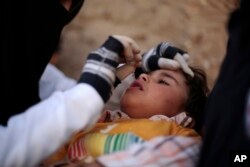The World Health Organization hopes to get a polio immunization campaign under way in the next week or two in the IS-controlled area of Deir Ezzor, Syria, where two new cases of the crippling disease were discovered this week.
The WHO reports two children in Deir Ezzor have been paralyzed by a vaccine-derived polio virus. Unlike the wild polio virus, vaccine-derived polio viruses are very rare; but, they can emerge in populations that have low immunity against the disease.
WHO spokesman Oliver Rosenbauer said the polio virus is circulating and must be stopped. He says a mass polio immunization campaign is being planned, targeting some 90,000 children under age 5 in the district of Mayadin in Deir Ezzor.
"We have the global supply," Rosenbauer said. "It can be released, but, the big question, as you rightly pointed out — how is it going to be delivered, who is going to deliver it. That is always the challenge."
Security and access to the area are dangerous and difficult because it is controlled by Islamic State militants. In 2013 and 2014, an outbreak of the wild polio virus occurred in this same region. Thirty-six cases were reported at that time.
Rosenbauer told VOA that security is not the only concern. He said it is possible that children could become infected with polio from the vaccine-derived strain during the immunization campaign. That is why, he said, the vaccine must be used with complete discretion.
"Really only use it when the … benefits of it are greater," Rosenbauer said. "What we have is an outbreak. So, we need to consider that and do an outbreak response that outweighs the risk of a possible future outbreak."





